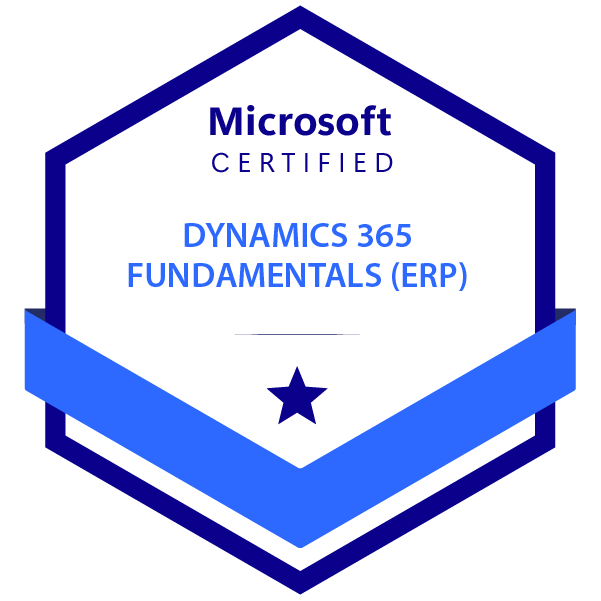
Summary of the Curriculum
Build a strong foundation in enterprise resource planning with our Microsoft Dynamics 365 Fundamentals (ERP) Course, designed to prepare you for the MB-920 certification and introduce you to the core finance and supply chain capabilities of Microsoft Dynamics 365.
At Acquledge, this course helps you understand how Dynamics 365 unifies business processes across Finance, Supply Chain Management, Commerce, Project Operations, and more. You’ll explore core modules like general ledger, accounts payable and receivable, cash and expense management, as well as key supply chain functions such as inventory control, procurement, warehousing, and manufacturing strategies.
You’ll also get hands-on with reporting tools, workflow automation, and integrations with Power BI, Microsoft 365, and the Power Platform—giving you the full picture of how modern ERP systems power smarter business operations.
Whether you’re a student, business user, or new to ERP systems, this course offers the perfect launchpad to understand and navigate Microsoft’s finance and operations ecosystem.
Enrollment Process
- Sign up on the platform and choose your preferred batch.
- Start your classes on the scheduled date .
- Get access to learning materials and project dashboards.
- Begin your training journey with expert-led sessions.
- Apply your learning through real-world case studies and projects,
Detailed Course Curriculum
Core Capabilities of Dynamics 365 Finance and Operations Apps (25–30%)
- Enterprise Resource Planning (ERP) Overview
- Understand the concept and value of ERP systems
- Explore how Dynamics 365 unifies business processes across finance, supply chain, commerce, human resources, and project operations
- Finance and Operations Apps Use Cases
- Identify business scenarios for using finance and operations apps
- Explore the user interface and navigation basics
- Reporting and Integration Capabilities
- Built-in reporting features, including workspaces and dashboards
- Analyzing data with Power BI
- Integration with Microsoft Office 365 (Excel, SharePoint, Teams)
- Integration with Microsoft Power Platform
- Common Features
- Security model and roles
- Workflow capabilities for process automation
- Understanding and managing batch jobs
- Dynamics 365 Finance (30–35%)
- Finance Core Capabilities
- Use cases for Finance
- Organization and legal entity structures
- Reporting and accounting currencies
- Tax management and cost accounting concepts
- General Ledger
- Chart of accounts, main accounts, and fiscal calendars
- Financial dimensions and dimension sets
- Accounting structures and financial journals
- Periodic financial processes
- Accounts Payable and Receivable
- Vendor management, purchase orders, and vendor invoices
- Vendor payments, settlements, and three-way matching
- Customer management, customer invoices, and free text invoices
- Credit management and collection processes
- Subscription billing concepts
- Expense, Fixed Asset, and Budget Management
- Cash and bank management
- Expense management
- Fixed asset management
- Budgeting capabilities
- Dynamics 365 Supply Chain Management (35–40%)
- Supply Chain Management Core Capabilities
- Use cases and business scenarios
- Product and released product management
- Product master records, variants, and dimensions
- Pricing, discounts, and trade agreements
- Intercompany capabilities
- Manufacturing Process
- Lean, discrete, and process manufacturing types
- Manufacturing strategies
- Bills of materials (BOMs), formulas, routes, and operations
- Production lifecycle and shop floor management
- Master planning and planning optimization
- Inventory and Warehousing
- Costing methods (standard, weighted average, LIFO, FIFO)
- On-hand inventory management
- Inventory journals
- Quality management
- Warehouse Management System (WMS) and Transportation Management System (TMS)
- Landed cost use cases
- Sales and Procurement Processes
- Order-to-cash and procure-to-pay processes
- Sales order creation, fulfillment, inventory reservations, picking, and packing
- Purchase requisitions, purchase order creation, and receipts